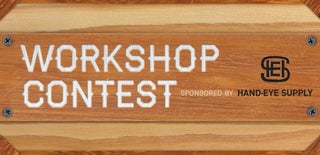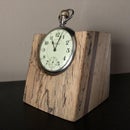Introduction: Floating Shelves
I don't know about you, but I have some stuff ... and some of that stuff looks pretty nifty on a shelf. If you saw "The Faux Metal Desk," you know my hatred for MDF, but you also know I had some left over and planned to use it specifically for shelves.
I wanted the shelves to be substantial ... not some 3/4" plank nonsense. Nice chunky shelves just floating there and being awesome.
Step 1: Cut and Prep the Parts
I ripped the parts to width on the table saw and then cut them to length on the miter saw. After that, I cut the rabbets on the table saw and cleaned them up with a putty knife and hammer. It's MDF, you don't need a chisel ... you could do it with your fingernail (don't do that).
I chose rabbets because I like rabbits and they are similar. I also chose rabbets because they help me align the parts when assembling.
Step 2: Assembly
Initial assembly was done with glue and brad nails. Everything was reinforced with screws. I used drywall screws just to annoy the purists.
Step 3: Filling and Sanding
Since I wanted the look of a solid slab floating on the wall, I need to fill all the seams. I used wood putty and once it was dry, I sanded it outside with an orbital sander.
The dimensions on these shelves are somewhere around 48" Long x 8" Wide x 5" Deep.
Step 4: Paint
Several coats of satin black paint until I was satisfied with the coverage (I'm never satisfied).
Step 5: Installing the Cleats
My house is 90 years old ... you guess it ... horse hair plaster. I take my time laying out the studs so as not to make a mess of the plaster. Placement of the cleats, and therefore the shelves, were somewhat dictated by the location of studs. I wanted to hit at least three studs per cleat. I secured them with some lag bolts and washers. I don't remember how long, but since the cleats are 1 1/2" + the plaster + the slats, I'd say at least 4" long. I painted the ends black because I foresaw gaps thanks to the wavy walls.
Step 6: Hang the Shelves
I laid out and drilled some holes in the tops of the shelves so I could secure them to the cleats. Some people screw them in from the bottom, but you are dealing with two forces here - gravity and shear. Screws on the top are way better at fighting shear than screws on the bottom trying to hold all the weight. I used tape so as not to mar the paint.
Last step was to display all my small percussion instruments.

Participated in the
Organization Contest

Participated in the
Workshop Contest













